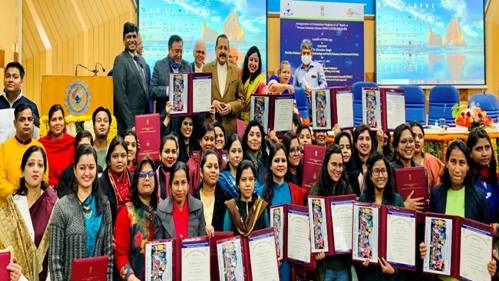Union Minister of State (Independent Charge) Science & Technology Dr Jitendra Singh said that women start-ups are leading the innovative success stories of India.
Speaking at the inaugural session of the 12th batch of the Women scientist Scheme-C, WISE-KIRAN IPR of DST training programme in New Delhi, he said that many of the big scientific projects including that of Gaganyaan are being led by women scientists.
He said, even during the COVID pandemic, it was the Women Self Help Groups from Northeast who led from the front in providing bulk supply of face-masks in different innovative designs and colors to match the attire and big branded houses picked up the cue from them to manufacture the same.
He said, one of the key pillars of Prime Minister Narendra Modi’s New India is the success story of women innovators in the country. The Minister said that soon after taking over as Prime Minister in 2014, Narendra Modi took several steps to institutionalize women participation in scientific endeavors.
Dr Jitendra Singh highlighted that the alumni from the Women Scientist Scheme-C (KIRAN IPR) scheme contribute to 10% of active patent agents in the country. He said, DST is actively engaged in creating an enabling environment for women in the science and technology domain with ‘Wos C scheme creating a significant impact on the IPR ecosystem in India. It is not only empowering the women, but also creating human resources for strengthening the S&T ecosystem of the country, the Minister added.
Dr Jitendra Singh said that the WoS-C scheme or the WISE KIRAN-IPR’ supported by the Department of Science & Technology (DST) is being run by the Technology Information, Forecasting and Assessment Council (TIFAC), a technology and policy think tank, to bring back women who could not pursue their career in science and technology field due to domestic compulsions into professional field.
Dr Jitendra Singh said that the WOS-C scheme is a part of the bigger scheme in DST which aims to train women in IPR and related matters. He said, when the scheme started, only 20 women were trained in one year; however, over the years seats have increased to 120.
Dr Singh recalled that the women scientist scheme was conceived in the year 2002 under the leadership of the then Prime Minister Atal Bihari Vajpayee. Referring to the New IPR Policy of 2016 introduced under the leadership of Prime Minister Modi, which has many components like creating IP awareness, IF facilitation and capacity building, the Minister said, women can pitch in large numbers and give their contribution to the society by way of their assistance in nurturing and exploiting the Patents.
Dr V.K. Saraswat, Member NITI Aayog and Chairman TIFAC Governing Council, said the Women Scientist Scheme has contributed in enhancing the quality of drafting of patents as they are highly qualified in their respective technology domains in addition to intense training on IPR and patents.



